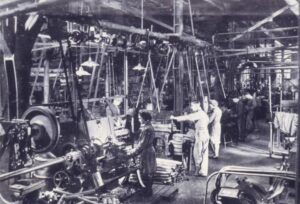Most employees are not engaged at work (59% as the lowest estimate). Many organizations are failing to adapt to customer needs and market shifts. I always wondered how did we get here? Understanding the current mindset in the workplace is our invention and what brought us here cannot take us forward.
The Progress of the industrial revolution
The industrial revolution has brought wealth and abundance we have never seen before. Cars replaced horses, average people can afford to have many shoes, and having a refrigerator in most places is a given. All this seemed science fiction 200 years ago.
The pace of progress significantly increased during that period compared to previous history. This included technological and institutional inventions such as patent rights and corporations. Yet, this pace is not enough anymore, neither is the way of thinking that got us this far.
The industrial revolution focused on important aspects, such as efficiency, utilization, and unison. This solidified in hierarchies and top down approach of thinkers and doers. It is worth mentioning that this is part of human nature. It is how societies function since farming and land ownership. No, even since hunters and gatherers. It was only confirmed, highlighted, and structured during the industrial revolution. All this had made hierarchies extreme, in a way that goes against our nature and the nature of innovation.
What is wrong with the industrial revolution thinking?
This system started showing its weakness when the problems became more complex. Also, The invention of computers that started taking over basic and even complicated work. For example, cars has a computer that tells the mechanic what is wrong. Speed to effective solutions that solve problems are more important than efficient ones that do not. Even utilization failed to manage humans and solve complex problem.
This industrial revolution and manufacturing model became prevalent throughout our lives. Impacting, among many things, our education, which is foundational to our mindsets. A teacher is the source of information, grades are linear and students grouped based on when they were born.
X and Y theories of Management
I would need to highlight theory X and Y in management and scientific management. A theory X manager considers employees to dislike their work, are lazy and need supervision at every step. while theory Y managers believe that employees enjoy working on their initiatives, seek and accept responsibility, and need little guidance.
Blindly generalizing scientific management
Scientific management (also known as Taylorism) has amazing concepts. Such as challenging existing methods and having a scientific approach to improve work. but it takes autonomy from workers, also known as thinkers vs. doers. Managers were smarter and dictated how work must be implemented. Even Taylor warned on misusing his principles “The same mechanism which will produce the finest results when made to serve the underlying principles of scientific management, will lead to failure and disaster if accompanied by the wrong spirit in those who are using it.” – Frederick Winslow Taylor, The Principles of Scientific Management.


